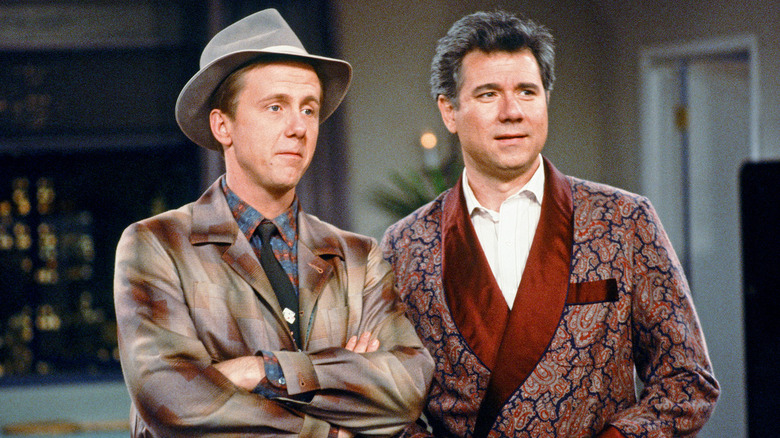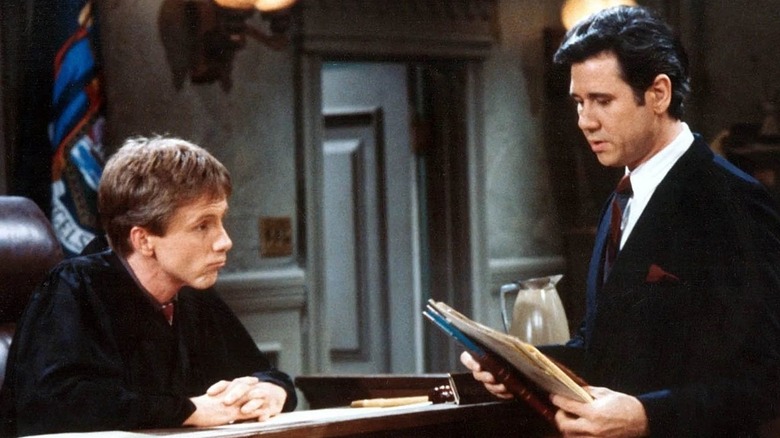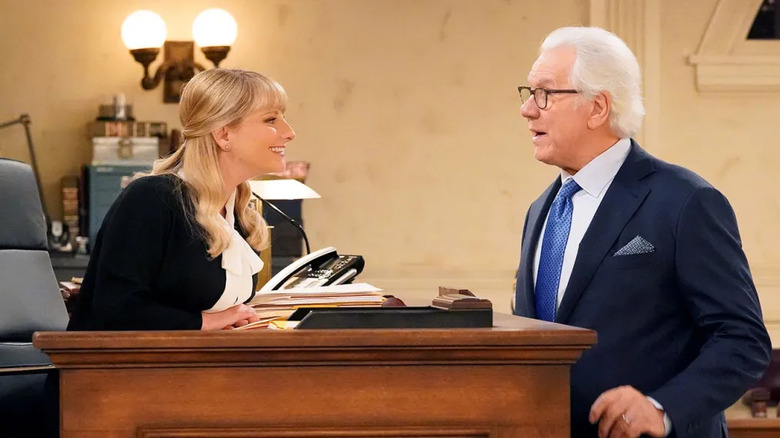Why Night Court's John Larroquette Put A Stop To His Emmy Wins In The 80s
"Night Court" was part of the legendary NBC Thursday night lineup back in the mid-1980s. It ran in a block with "The Cosby Show," "Cheers," and "Family Ties," a proud part of a sitcom renaissance that lasted through to the end of the decade. Of that lineup, "Night Court" was the black sheep, offering up broader characters, wackier scenarios, and a surrealist tone that kept it just a few steps removed from reality. The series was set in a Manhattan Criminal Court, but only during its night shift, when all the weird cases came in. Harry Anderson played Judge Harry Stone, although the late hours had made him playfully unbalanced. Also often on the night shift was prosecutor Dan Fielding (John Larroquette), a lascivious narcissist and amusingly crude a-hole.
Larroquette was exceptional in the role. "Night Court" ran from 1984 to 1992, and Larroquette won Primetime Emmys four of those years, from 1985 to 1988. Larroquette, it should be noted, is a widely awarded actor, having been nominated for seven Emmys in his career, and winning five; his other nominations and wins also came from "The John Larroquette Show" and "The Practice."
Larroquette might have won even more Emmys had he not deliberately withdrawn his name from consideration in 1989. The actor broke a record at the time with his four consecutive wins, and felt that four was enough; he likely no longer wanted to hog all the glory, and courteously stepped aside to let other actors have a chance.
As one might imagine, Larroquette has been asked a lot about his decision to deny himself further "Night Court" Emmys, and he has been frank about his decision. In a 2008 interview with the A.V. Club, he admitted that he was struck by a lack of confidence in his own work.
'It was a combination of two things'
So why did he do it? Larroquette, who has also played a Klingon in "Star Trek," is frank about his confidence, and how he felt his performance eventually wasn't as good as it was at the beginning:
"People ask me this question a lot, and I try to investigate my real feelings at the time and why I did it. It was a combination of two things. Quite frankly and honestly, I didn't think that the work that I had done was as good as it was, only partially because [creator] Reinhold [Weegee] had left by then, and new producers had come in."
Also, like many TV stars, Larroquette began to fear the long-term effects Dan Fielding would have on his career. Sure, the Emmys were nice, but he also knew that he didn't want to be pigeonholed into a position where Dan Fielding was all he'd be known for, since he can play a wide variety of roles beyond sleazy lawyers and lotharios. Deliberately ceasing his run of Emmy wins was a way for Larroquette to slowly remove himself from the public consciousness:
"[M]ore selfishly, quite honestly, I knew that the character had made a really deep impression on the American public, and on studios and producers and directors and writers, but it was going to end someday. I wanted to fade into the background with this guy a little bit, so that there would be a possibility of eventually doing something else. And as it turns out, it was 10 years after 'Night Court' ended before I got a role as a dad. Because he was such a bizarre character, he had made such an impression, that typecasting does happen."
Indeed. Just ask William Shatner or Adam West about that.
Could John Larroquette win another Emmy for Night Court?
And, indeed, Larroquette said that he was being typecast already. He had received many, many offers to play other parts, many of them very much like Dan Fielding:
"Every role was some sleazy lawyer or some sleazy this or some sleazy that. It was sort of selfishly motivated. I loved the show, but it was time to move on. And after four in a row, I felt the rumblings; it seemed sort of piggish to continue that, so I thought it best just to not nominate myself any more."
Luckily, Larroquette was able to continue a prolific film and TV acting career. During his tenure on "Night Court" and for the next few years, he appeared in the films "Madhouse," "Tune in Tomorrow," "Richie Rich," and Oliver Stone's "JFK." His sitcom, "The John Larroquette Show," lasted for 84 episodes and he produced an American remake of "Fawlty Towers" called "Payne" in 1999. He played one of the main roles in "The Librarians," and starred in 10 "McBride" TV movies.
After many years of variety in his career, Larroquette felt comfortable enough to return to the role of Dan Fielding in a 2023 revival of "Night Court." In this new version of the show, Dan is less of a lothario, having settled down and married since the last rendition of the series. He was also widowed, leaving him a little sad and humbled. He is still, however, sarcastic and impatient. Also returning to the revival was Marsha Warfield, who played the wry bailiff Roz in the original series. The new "Night Court" is currently in the middle of its second season. As of this writing, Larroquette has not been nominated for any additional Emmys, but it seems like it's only a matter of time.


